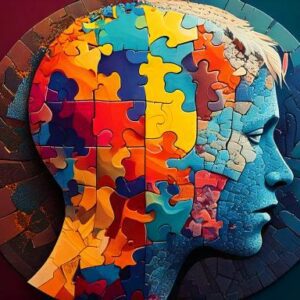The concept of neurodiversity has significant implications for mental health diagnoses, challenging traditional medical models and promoting a more inclusive understanding of mental health conditions.
Neurodiversity paradigm: Neurodiversity suggests that variations in brain function, such as those seen in autism and other neurodevelopmental disorders, are natural and should not be pathologised as disorders. This perspective encourages viewing these conditions as part of the normal spectrum of human diversity rather than as deficits requiring treatment (Barber, 2021; Miclea, 2024; Baron-Cohen, 2017; Chapman, 2021; Masataka, 2017).
Impact on diagnostic systems: The neurodiversity movement advocates for a shift from rigid psychopathological models to more humanised approaches in psychiatry. This could potentially revolutionise how mental health conditions are diagnosed and treated, emphasising acceptance and support over cure (Miclea, 2024; Baron-Cohen, 2017; Fletcher-Watson, 2023).
Social and Clinical Implications
Social constructs and labels: The movement questions the social constructs and labels associated with being neurodiverse or neurotypical, suggesting that these labels can contribute to social fracturing and alienation if not handled sensitively (Barber, 2021; Miclea, 2024).
Clinical practice: Neurodiversity-affirming practices in clinical settings focus on acceptance and support rather than symptom reduction. This approach is particularly relevant in autism, where mental health is linked to acceptance and quality of support rather than symptom severity (Pantazakos & Vanaken, 2023; Fletcher-Watson, 2023).
Challenges and Considerations
Integration into clinical work: There is a need for concrete methodologies to incorporate neurodiversity into clinical practices effectively. This includes respecting the neurodivergent identity while also addressing therapeutic needs (Pantazakos & Vanaken, 2023).
Potential for social fracturing: While promoting diversity, there is a risk of amplifying social divisions if the neurodiversity paradigm is not carefully integrated into societal and clinical frameworks (Miclea, 2024).
Conclusion
The neurodiversity paradigm offers a transformative perspective on mental health diagnoses, advocating for a shift from deficit-focused models to those that recognise and support cognitive diversity. This approach emphasises societal acceptance and support, potentially leading to more inclusive and effective mental health practices. However, careful integration into existing systems is necessary to avoid social and clinical challenges.
References
Barber, C. (2021). Neurodiversity and mental health. British Journal of Mental Health Nursing. https://doi.org/10.12968/BJMH.2020.0051
Baron-Cohen, S. (2017). Editorial Perspective: Neurodiversity – a revolutionary concept for autism and psychiatry. Journal of child psychology and psychiatry, and allied disciplines, 58 6, 744-747. https://doi.org/10.1111/jcpp.12703
Chapman, R. (2021). Neurodiversity and the Social Ecology of Mental Functions. Perspectives on Psychological Science, 16, 1360 – 1372. https://doi.org/10.1177/1745691620959833
Fletcher-Watson, S. (2023). Autism and neurodiversity: a new paradigm. Journal of Neurology, Neurosurgery, and Psychiatry, 94, e2. https://doi.org/10.1136/jnnp-2023-bnpa.5
Masataka, N. (2017). Implications of the idea of neurodiversity for understanding the origins of developmental disorders. Physics of life reviews, 20, 85-108. https://doi.org/10.1016/j.plrev.2016.11.002
Miclea, B. (2024). Neurodiversity and Mental Disorders. BRAIN. Broad Research in Artificial Intelligence and Neuroscience. https://doi.org/10.18662/brain/15.2/574
Pantazakos, T., & Vanaken, G. (2023). Addressing the autism mental health crisis: the potential of phenomenology in neurodiversity-affirming clinical practices. Frontiers in Psychology, 14. https://doi.org/10.3389/fpsyg.2023.1225152
